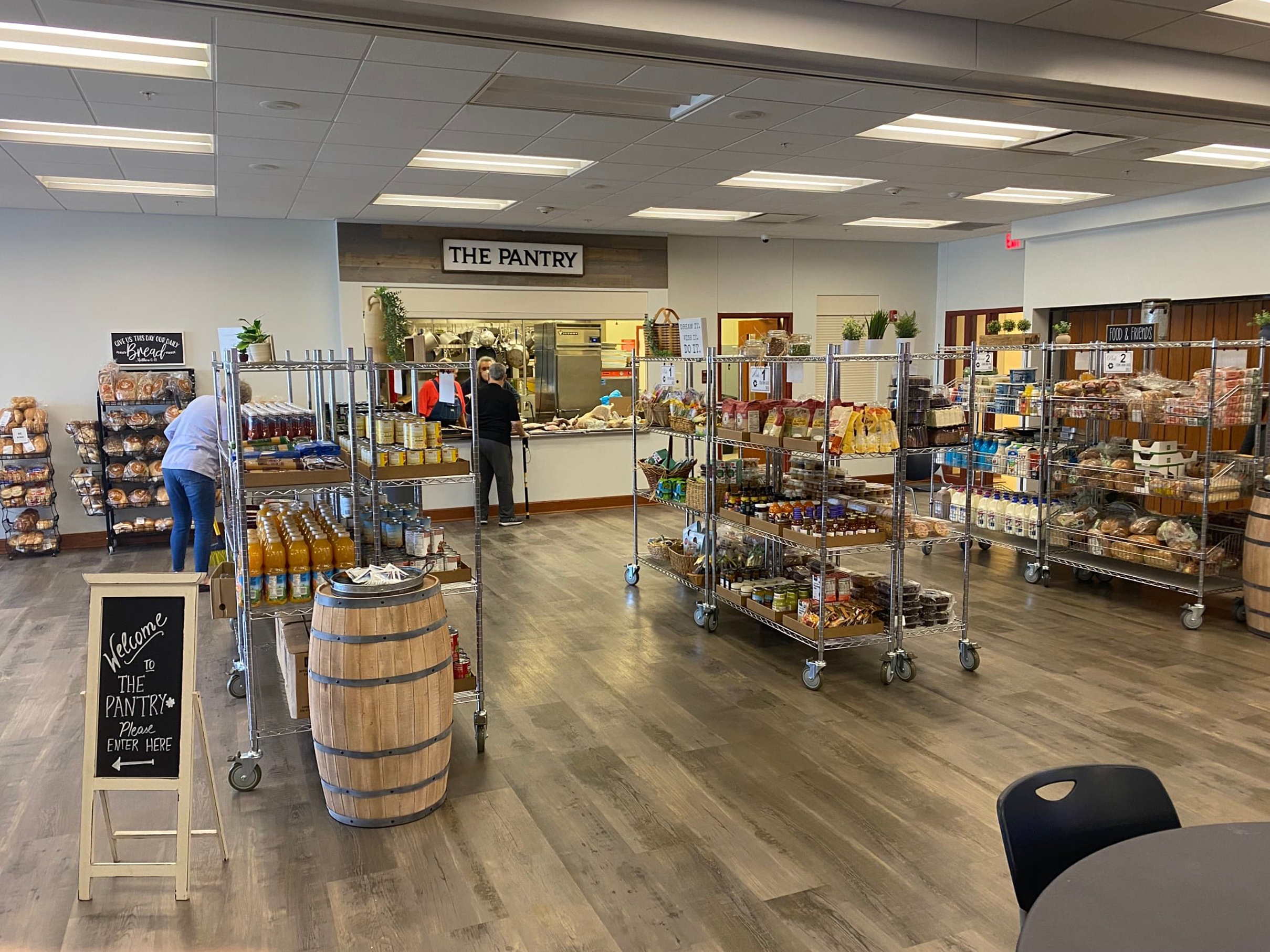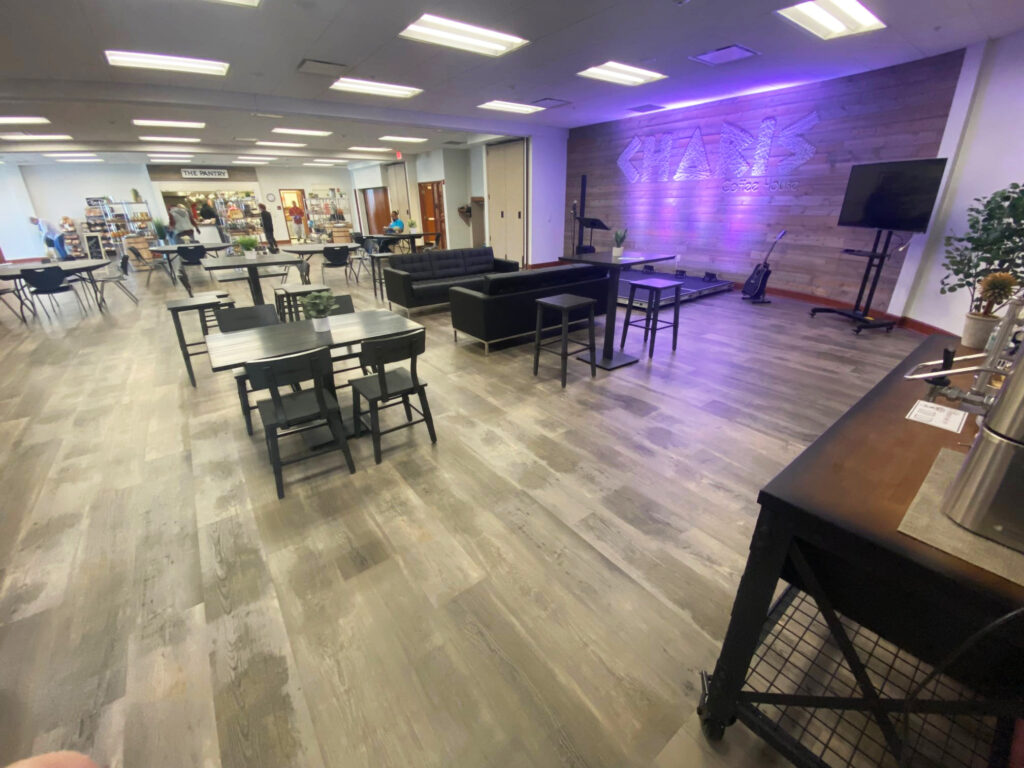Building bridges in Pittsburgh
by Robert Mitchell

The Pittsburgh Temple hopes to provide more than just food through its choice pantry.
The city of Pittsburgh is home to almost 450 bridges. Known as the “City of Bridges,” Pittsburgh sits at the confluence of the Allegheny, Monongahela, and Ohio rivers.
So, it seems appropriate that The Salvation Army’s Pittsburgh Temple would be trying to build bridges to the church from its popular new choice food pantry, which opened last year. Captain Justin Caldwell says he and several members of his Salvation Army church are intentional about inviting food pantry guests to the corps and its activities. The effort to get people out to the corps for Sunday morning worship has been slow but steady.
“These people are in great need, and over time you develop relationships,” says Chris Honsberger, who volunteers at the pantry every Thursday. “It takes time to create these relationships with people, but we have had some crossover. All of a sudden, people start to show up for church, but people tend to be very shy and skeptical when it comes to stuff like that.”
More than 100 families come out for the food pantry each week, and Honsberger says anywhere from five to 10 clients have attended worship service at the corps at one time or another—sometimes unexpectedly.
After one such client came to church recently, Honsberger says, she thought: God, I don’t know how you do it.
“It seems slow from the outside, but we don’t know what the Lord has in mind,” she says. “I just know that whatever the Lord’s timing is, that’s perfect timing. Relationships are being cultivated, and you never know where that’s going to go. I give that to the Lord.”
Work in progress
Caldwell says the church has had better luck getting food pantry patrons to come for church outreach events like the popular “Back to School Bash,” where young people received backpacks, school supplies, clothing, and haircuts. The clients are also told about Sunday services, Bible studies, and the Adult Rehabilitation Center.
Getting more people from the pantry to attend church and hear the gospel message remains a major goal, Caldwell says.
“This is something we’re constantly praying about, strategizing, and asking God how we can do it. There’s a lot of potential. We’re still super hopeful. We’re waiting for that home run hit,” Caldwell says.
One way to build those bridges is to have soldiers from the corps show up each week to volunteer, share God’s love, and pray with people. “I’m a big believer in relationship evangelism,” he says. “That takes time to build those relationships.”
With Christian music playing, Caldwell sometimes gives out prizes such as gift cards while people wait. They’re always told about church, Bible studies, youth programming, and upcoming events.
A welcoming place
Caldwell purposely leaves the door to the sanctuary open as a sign that everyone is welcome for church. His wife, Captain Evelyn Caldwell, helps some of the clients join the ConnectUp prayer ministry.
“They walk right by the sanctuary so it’s kind of an advertisement for it,” Captain Justin says. “They all know that we have a church there. We do pray with people. Even if it’s only one person who comes to the Lord through this ministry, it’s worth it.”
He adds, “When people wait for their turn to shop, it’s an opportunity for church members from the corps to be there, to love on people, and to have relationships with people. They can see the chapel. We’re kind of taking the approach of evangelizing through building relationships. We believe if we do this right, if we love well, then we believe people will ask and want to be a part of this.”
Clients wait in a homey area with tables, couches, and a small stage where music is sometimes performed.
Patty Dippold is a member of the Breakfast Club, a group of women who arrive early and give out muffins, donuts, coffee, and water as clients wait their turn. The others include Sally Mattiello, Patty Smith, and Mary Ann Bucci. Sonja Bey calls out the names of who’s next.
“Sonja knows all the people and everything about them,” Dippold says. “She calls all the men handsome and all the women beautiful, and we try to make them all feel welcome.”
Dignified approach
The pantry is set up like a real grocery store, and the guests use real shopping carts. Volunteers from the corps help people load up their cars after they’ve chosen all their groceries.
“They really get the experience of shopping. We try to make it as welcoming as we can,” Captain Justin says.
Besides grocery staples, there are meats, seafood, milk, eggs, produce, and sometimes baby formula, diapers, and toilet paper. Several restaurants and grocers contribute.
The choice pantry grew out of the COVID-19 pandemic, Caldwell says.
“Before COVID, we were getting some items donated from various stores. It was rather small,” he says. “Once COVID happened, it was kind of a big need in our area. We started accumulating more food. Some of us here had this vision of a choice pantry, where people would have the ability to choose the items that they need for their family.
“The people have found out about it, and the numbers have increased. Companies and grocery stores have heard about us and given us more food. The feedback is that the clients really appreciate the approach. We wanted to create this space where we felt it was uplifting and where people felt dignified.”
One recent client told Caldwell, “I feel like I can hold my head high while I’m in here. This is beautiful—and thank you guys for what you’re doing.”
Caldwell says, “I thought to myself, This is exactly what we were going for.”
The pantry is an important weekly commitment for many of the volunteers. Retirees Dippold and her husband, Bob, make a day of it on Thursdays. “My husband and I call that our special day,” she says. “We go and do that, we do lunch, and then we relax the rest of the day.”

The pantry has a space with tables and couches where visitors can sit and talk before or after picking up their food.

